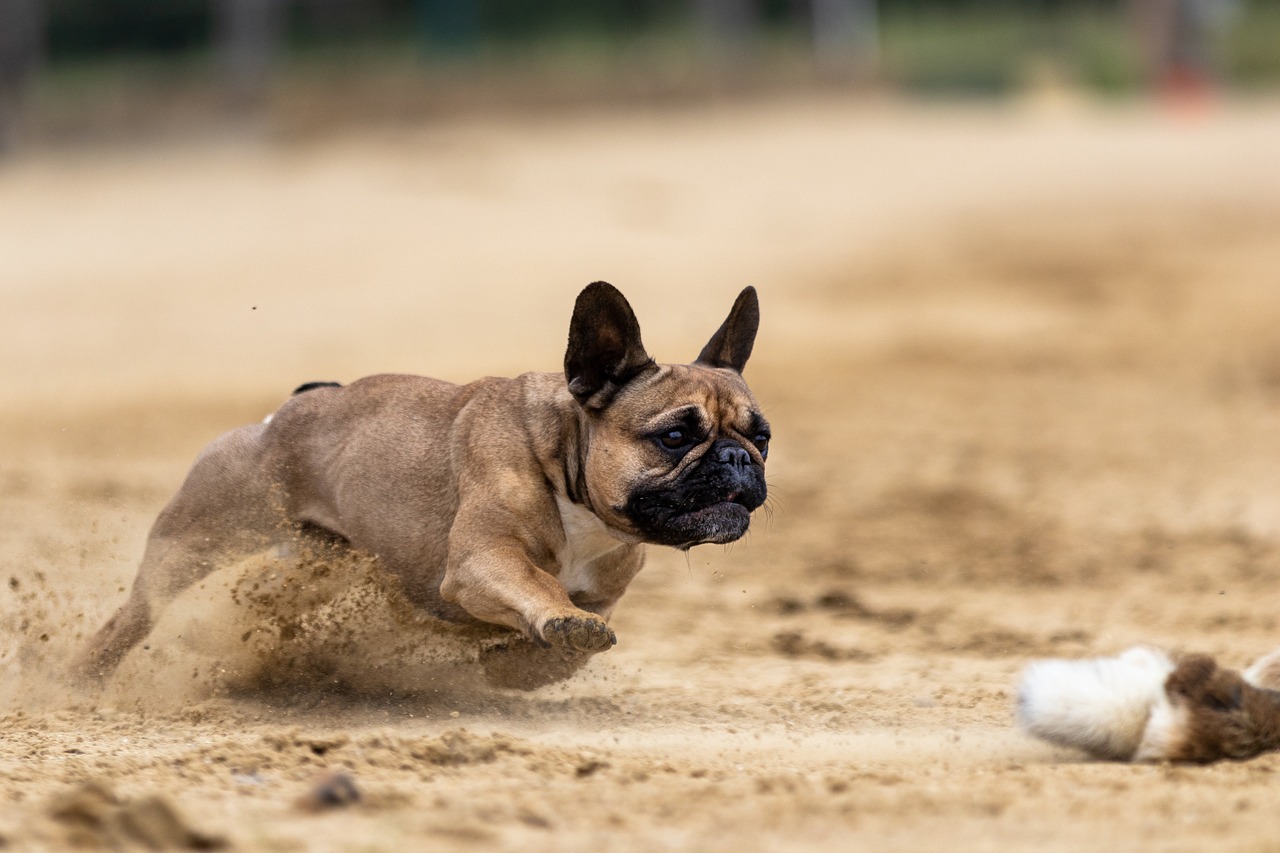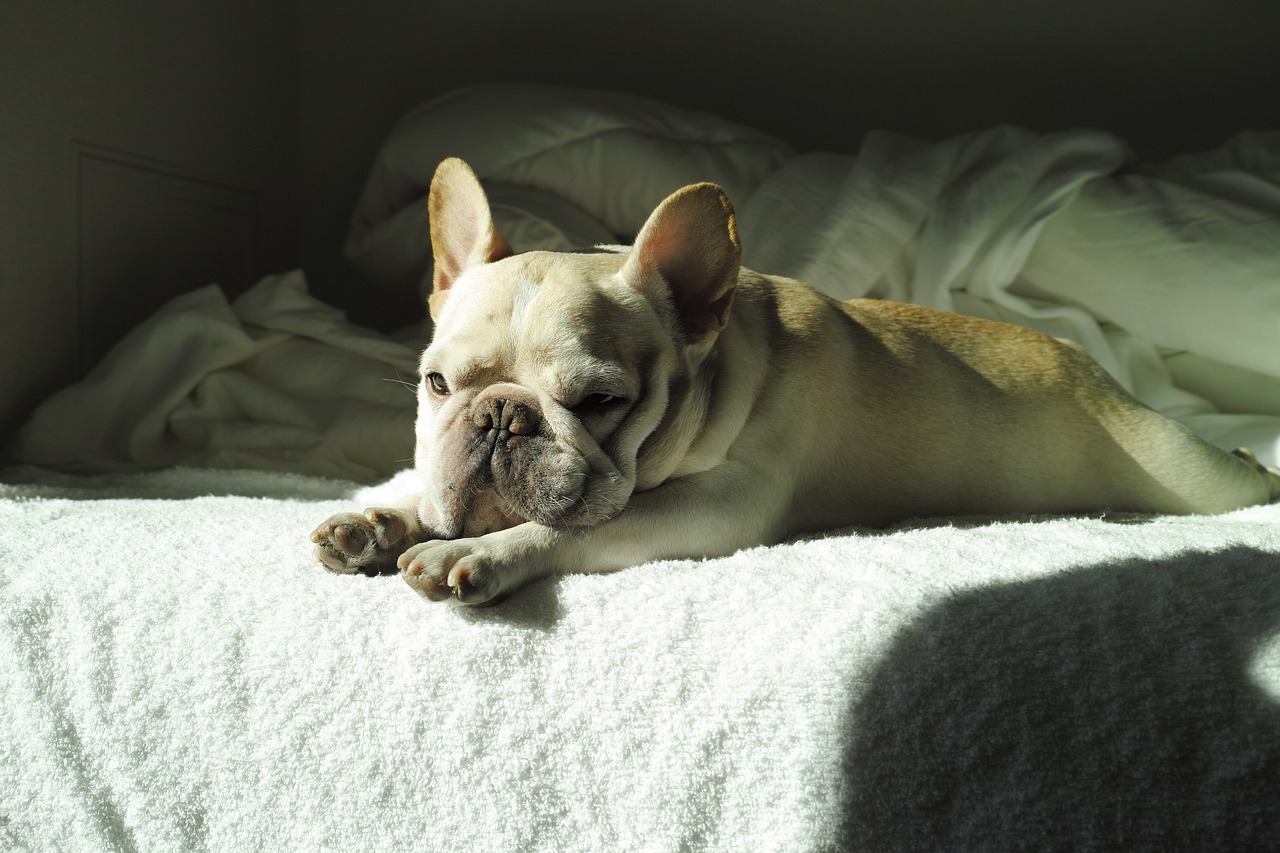A Guide to Understanding the French Bulldog’s Personality
Welcome to the fascinating world of French Bulldogs! These adorable little companions are not just cute faces; they possess a unique personality that can light up any room. If you’ve ever found yourself captivated by their charming antics or those big, expressive eyes, you’re not alone! Understanding the personality of a French Bulldog is essential for creating a harmonious relationship between you and your furry friend. This article will dive deep into their playful nature, affectionate tendencies, and the quirks that make them so special. By the end, you'll be equipped with the knowledge to nurture their personalities and ensure a fulfilling life for both you and your pet.
French Bulldogs are renowned for their playful demeanor, often bringing joy and laughter to their families. Picture this: a little bundle of joy with a wiggly tail, ready to pounce on anything that moves! Their playful nature is not just a phase; it’s a fundamental part of who they are. Engaging with them through play is crucial, as it helps to foster a fun and engaging environment. Whether it’s a game of fetch in the backyard or a simple tug-of-war with a favorite toy, these interactions not only keep them physically active but also strengthen the bond between you. Understanding this aspect of their personality allows you to create a stimulating environment where they can thrive.
Known for their loving disposition, French Bulldogs thrive on human interaction. They are the ultimate cuddle buddies, often seeking out your lap for a cozy nap or nudging your hand for a scratch behind the ears. This need for affection shapes their relationships, not only with their owners but also with other pets. It's essential to recognize that their affectionate nature means they can become quite attached to their humans. Leaving them alone for extended periods can lead to feelings of anxiety and loneliness. Therefore, showering them with love and attention is not just a luxury; it’s a necessity!
Socialization is crucial for French Bulldogs. These little dogs can be quite the characters, and exposing them to different environments and people enhances their social skills while reducing anxiety. Imagine a Frenchie who has never met another dog; they might become overly excited or even fearful when faced with new experiences. To prevent this, early exposure is key. Take them to parks, dog-friendly cafes, or even on playdates with other dogs. The more experiences they have, the better they will adapt to new situations.
Implementing early socialization techniques can significantly impact a French Bulldog's behavior. Here are some effective methods to introduce them to various stimuli:
- Start young: Begin socializing your French Bulldog as early as possible, ideally between 3 to 14 weeks of age.
- Variety is key: Expose them to different sounds, sights, and smells to build their confidence.
- Positive reinforcement: Use treats and praise to encourage positive interactions with new experiences.
Some French Bulldogs may develop social anxiety. This can manifest in various ways, such as excessive barking or hiding. To help manage these fears, consider the following strategies:
- Desensitization: Gradually expose them to the situations that cause anxiety.
- Calm environment: Create a safe space where they can retreat when feeling overwhelmed.
- Professional help: Don’t hesitate to seek guidance from a professional trainer if needed.
Training is vital for French Bulldogs to ensure they develop good manners. Their stubborn streak can sometimes make training a challenge, but with patience and consistency, you can teach them effectively. Use positive reinforcement techniques, such as treats and praise, to encourage desired behaviors. Remember, training should be a fun experience for both you and your dog. Incorporate games and short sessions to keep their attention. After all, who doesn’t love a well-behaved pup that can show off some cool tricks?
French Bulldogs have a distinct temperament that influences their behavior. They are known for being affectionate, playful, and sometimes a bit stubborn. Understanding these temperament traits is crucial for managing daily interactions. Their adaptability often makes them great companions in various living situations, from bustling city apartments to cozy homes. However, their stubbornness can pose challenges during training, which is why patience is essential.
This section highlights the common behavioral traits of French Bulldogs, including their stubbornness and adaptability. These traits can be both endearing and frustrating. For instance, their stubbornness may lead to a refusal to obey commands, while their adaptability means they can thrive in different environments. Recognizing these traits helps potential owners prepare for the unique challenges and joys that come with having a French Bulldog.
French Bulldogs can exhibit challenging behaviors, such as barking or chewing. This section discusses strategies to manage and correct these issues effectively. Consistency is key! Establishing a routine and setting clear boundaries can help mitigate unwanted behaviors. Additionally, providing plenty of mental and physical stimulation will keep your Frenchie happy and less likely to engage in destructive behavior.
A French Bulldog's health can significantly affect its personality. Regular veterinary care is essential for maintaining their overall well-being. When they feel good physically, their personality shines brighter! This section examines the link between physical well-being and behavioral traits, emphasizing the importance of regular check-ups and vaccinations.
Understanding common health issues in French Bulldogs is crucial for their well-being. Some prevalent health concerns include:
- Brachycephalic airway syndrome
- Hip dysplasia
- Skin allergies
These health issues can impact behavior, so being proactive about their health is vital for a happy, well-adjusted pet.
Promoting a healthy lifestyle through diet and exercise can enhance a French Bulldog's personality. Regular walks, playtime, and a balanced diet can help maintain their energy levels and overall mood. Consider incorporating interactive toys and puzzles to keep their minds engaged. After all, a healthy dog is a happy dog!
A positive home environment is essential for a French Bulldog’s happiness. Creating a nurturing space that caters to their needs will make a world of difference. Think of it as crafting a cozy nest where they can feel safe and loved. This section explores how to create such an environment, focusing on comfort and engagement.
Establishing safe spaces for relaxation can help French Bulldogs feel secure. Designate a quiet area in your home where they can retreat when feeling overwhelmed. Consider adding a cozy bed, their favorite toys, and some calming scents to create a tranquil atmosphere.
Engaging activities and mental stimulation are vital for a French Bulldog's well-being. Boredom can lead to destructive behavior, so it’s essential to keep them entertained. Activities like puzzle toys, scent games, and even training sessions can provide the necessary stimulation to keep their minds sharp and bodies active.
Q: Are French Bulldogs good with children?
A: Yes! French Bulldogs are typically gentle and affectionate with children, making them great family pets.
Q: How much exercise do French Bulldogs need?
A: French Bulldogs require moderate exercise, such as daily walks and playtime, to keep them healthy and happy.
Q: Do French Bulldogs shed a lot?
A: French Bulldogs do shed, but their short coat makes grooming relatively easy. Regular brushing can help manage shedding.

The Playful Nature of French Bulldogs
French Bulldogs are renowned for their playful demeanor, often bringing joy and laughter to their families. Imagine coming home after a long day, only to be greeted by a little bundle of joy, tail wagging and ready to play! Their playful nature is not just a trait; it's a way of life that can transform even the gloomiest of days into a celebration. These dogs have an innate ability to make every moment feel like an adventure, whether it’s chasing after a squeaky toy or engaging in a game of tug-of-war. They thrive on interaction and love to engage with their humans, making them the perfect companions for those who appreciate a lively atmosphere.
Understanding this aspect of their personality helps in fostering a fun and engaging environment for them. French Bulldogs are often described as the clowns of the canine world, and their antics can leave you in stitches. They have a unique way of turning mundane activities into playful escapades. For instance, a simple walk in the park can quickly evolve into a game of hide-and-seek with their favorite ball. Their playful spirit encourages owners to be active and involved, creating a bond that is both exciting and fulfilling.
Incorporating play into their daily routine is essential for their overall well-being. Regular playtime not only keeps them physically fit but also mentally stimulated. Here are some engaging activities you can enjoy with your French Bulldog:
- Fetch: A classic game that never gets old. Throw a ball or toy, and watch your Frenchie dash after it with enthusiasm.
- Obstacle Courses: Set up a mini obstacle course in your backyard or living room. Use chairs, cushions, and tunnels to create a fun challenge.
- Interactive Toys: Invest in toys that require problem-solving skills. These toys can keep your French Bulldog entertained for hours.
Furthermore, their playful nature can also serve as a great icebreaker. If you’re inviting friends over or meeting new people, having a French Bulldog around can lighten the mood and spark conversations. Their goofy personality often attracts attention, making it easier to connect with others. Just imagine the smiles and laughter as your Frenchie performs a silly trick or playfully interacts with guests!
However, it's important to remember that while play is essential, moderation is key. French Bulldogs can be prone to overheating due to their brachycephalic (short-nosed) structure. Always monitor their energy levels and provide plenty of water during play sessions. Keeping a balance between playtime and relaxation will ensure your furry friend stays happy and healthy.
In conclusion, the playful nature of French Bulldogs is a significant part of what makes them such delightful companions. Their ability to bring joy and laughter into our lives is unmatched. By embracing their playful spirit and engaging in fun activities, you not only enhance their quality of life but also strengthen the bond you share. So, get ready to unleash your inner child and enjoy the playful antics of your French Bulldog!

The Affectionate Companions
When it comes to companionship, French Bulldogs truly excel. These charming little pups have a knack for stealing hearts with their loving disposition and playful antics. If you've ever been greeted by a wagging tail and a pair of adorable bat-like ears, you know exactly what I mean. Their affectionate nature makes them not just pets, but cherished family members. They thrive on human interaction, often following their owners from room to room, eager to be part of every moment. It’s as if they have an innate understanding that their presence brings joy and comfort.
French Bulldogs are known to form strong bonds with their owners. They are often described as velcro dogs because they love to stick close to their favorite humans. This loyalty can be heartwarming, but it also means they can experience separation anxiety if left alone for extended periods. It’s crucial for owners to recognize this need for companionship and to ensure their furry friends feel secure and loved. Incorporating daily routines that include plenty of cuddle time and interactive play can help reinforce this bond.
Moreover, their affectionate nature extends beyond just their human families. French Bulldogs often get along well with other pets, provided they are properly socialized. They have a unique way of communicating their feelings, often through playful nudges or gentle barks. This makes them excellent companions not just for humans but also for other furry friends. However, a little bit of guidance goes a long way. Early socialization with various animals can help them develop into well-rounded companions. The goal is to create a warm, loving environment where they can thrive.
To further understand the depth of their affection, let’s look at some key behaviors that showcase their loving nature:
- Cuddling: French Bulldogs love to snuggle up next to their owners, often curling up in laps or beside them on the couch.
- Playfulness: Their playful antics can bring laughter and joy, making them delightful companions for families.
- Affectionate Greetings: Upon returning home, they often greet their owners with excitement, showcasing their love and joy at seeing them.
In summary, French Bulldogs are not just dogs; they are affectionate companions that bring a unique warmth to any household. Their need for love and interaction shapes their relationships, making them a joy to have around. By nurturing their affectionate nature and providing them with the attention they crave, owners can enjoy a fulfilling and loving relationship with their French Bulldog.
Q: How can I ensure my French Bulldog feels loved?
A: Regular playtime, cuddling, and positive reinforcement are key. Make sure to spend quality time with them daily.
Q: Do French Bulldogs get along with other pets?
A: Yes, with proper socialization, they can be very friendly and affectionate towards other pets.
Q: What should I do if my French Bulldog shows signs of separation anxiety?
A: Gradually get them used to being alone, provide them with toys, and consider crate training to create a safe space for them.
Socialization is one of the most crucial aspects of raising a well-adjusted French Bulldog. These charming little companions thrive on interaction, not just with their human families but also with other pets and various environments. Think of socialization as laying the groundwork for a solid relationship between your Frenchie and the world around them. When you introduce your pup to different settings, people, and experiences, you're helping them build confidence and develop essential social skills that will serve them throughout their lives.
Imagine a French Bulldog who has been exposed to diverse situations—this dog is likely to be more adaptable and less anxious than one who has been kept in a bubble. For instance, when a Frenchie encounters a variety of sights, sounds, and smells during their formative months, they learn to navigate the world with ease. This exposure reduces the chances of developing fear-based behaviors, which can lead to anxiety in new situations. So, how can you effectively socialize your French Bulldog?
Here are some key strategies to consider:
- Start Early: The critical window for socialization is between 3 and 14 weeks of age. During this time, your pup is like a sponge, soaking up new experiences. Take advantage of this period!
- Positive Experiences: Always ensure that new encounters are positive. Use treats and praise to create a positive association with new people, animals, and environments.
- Gradual Exposure: Introduce your French Bulldog to new experiences gradually. Start with less intimidating situations and progressively work up to more challenging ones.
In addition to these strategies, it's essential to recognize that each French Bulldog has its personality. Some may be naturally outgoing, while others may be a bit more reserved. Tailoring your approach to your dog's temperament will yield the best results. For example, if your Frenchie is shy, you might want to introduce them to new experiences in a calm and controlled manner, allowing them to feel secure before diving into more stimulating situations.
Remember, socialization isn't just a one-time event; it's an ongoing process. Regularly exposing your French Bulldog to new experiences throughout their life will help maintain their social skills and confidence. Whether it’s a trip to the dog park, a visit to a pet-friendly café, or simply a stroll through a bustling market, each new adventure is an opportunity for your Frenchie to learn and grow.
Ultimately, the goal of socialization is to cultivate a well-rounded, confident, and happy French Bulldog. By investing time and effort into their social skills, you're not just enhancing their personality; you're also enriching your own life with a more balanced and joyful companion.
1. What age should I start socializing my French Bulldog?
It's best to start socializing your French Bulldog between 3 and 14 weeks of age, as this is the most critical period for their development.
2. How can I tell if my French Bulldog is anxious in social situations?
Signs of anxiety can include excessive barking, hiding, or trying to escape. If you notice these behaviors, it’s essential to address them gently and positively.
3. Can I socialize my French Bulldog after the critical period?
Yes, while the critical period is essential, socialization can and should continue throughout your dog’s life. The key is to introduce new experiences gradually and positively.
4. What are some good places to socialize my French Bulldog?
Consider dog parks, pet-friendly stores, and community events. Each of these environments offers different stimuli that can help your Frenchie become more comfortable in various situations.
Socializing your French Bulldog at an early age is like planting a seed that will blossom into a well-adjusted, happy companion. The first few months of a puppy's life are crucial for developing their social skills and shaping their personality. It's essential to expose them to a variety of experiences, environments, and people to help them become confident and adaptable adults. But how do you go about this? Let's dive into some effective early socialization techniques that will set your Frenchie up for success.
First and foremost, puppy classes can be a fantastic starting point. Enrolling your French Bulldog in a well-structured puppy training class not only teaches basic commands but also provides an opportunity for them to interact with other dogs and people. This exposure is invaluable, as it helps them learn proper behavior in a controlled environment. Remember, the goal is to create positive associations with new experiences. So, when introducing your pup to a new dog or person, ensure that the interactions are gentle and rewarding.
Another effective technique is to take your puppy on outings. Whether it’s a stroll through a busy park, a visit to a pet-friendly café, or even a trip to the vet, these experiences are essential for socialization. The more varied the environments, the better. Just like how we learn from different cultures and experiences, your French Bulldog will learn to adapt to various situations. Make sure to carry treats with you to reward them for calm behavior during these outings, reinforcing positive experiences.
Additionally, introducing your French Bulldog to different sounds, sights, and smells is crucial. Play recordings of common household noises such as vacuum cleaners, doorbells, and children playing to help them get accustomed to everyday sounds. You can also expose them to various textures and surfaces, like grass, concrete, and sand, to broaden their sensory experiences. This can prevent fearfulness later in life, making them more adaptable to new situations.
It’s also important to encourage positive interactions with strangers. Invite friends and family over to meet your puppy, ensuring that they approach gently and calmly. This will help your Frenchie to associate new people with positive experiences, reducing the likelihood of fear or aggression in the future. Always supervise these interactions and reward your pup for friendly behavior.
Lastly, don't forget about the power of play! Engaging in games like fetch or tug-of-war not only strengthens your bond but also teaches your French Bulldog how to interact with you and other dogs positively. Playtime is an excellent opportunity to reinforce good behavior and social skills in a fun and relaxed setting.
In summary, early socialization is about creating a rich tapestry of experiences for your French Bulldog. By exposing them to a variety of people, environments, sounds, and textures, you're setting the stage for a well-rounded, confident adult dog. Remember, the earlier and more positively you socialize your pup, the more likely they are to develop into a happy and well-adjusted companion.
- How early should I start socializing my French Bulldog?
It's best to start socializing your French Bulldog as early as 7 to 8 weeks old. This is when they are most receptive to new experiences.
- What if my puppy seems scared during socialization?
Take it slow! If your puppy shows signs of fear, back off and try again later. Always ensure that the experiences are positive and rewarding.
- Are puppy classes necessary for socialization?
Puppy classes are highly beneficial as they provide a safe environment for socialization with other dogs and people, along with basic training.
- How can I tell if my French Bulldog is well-socialized?
A well-socialized French Bulldog will exhibit confidence in new situations, show curiosity rather than fear, and interact positively with other dogs and people.
Social anxiety in French Bulldogs can be a significant concern for many owners. Just like humans, these lovable companions can feel overwhelmed in unfamiliar situations or crowded environments. Imagine being a small dog surrounded by towering strangers or loud noises; it can be quite daunting! As a responsible pet owner, understanding how to manage this anxiety is crucial for the well-being of your furry friend.
First and foremost, patience is key. You need to approach your French Bulldog's anxiety with a calm and understanding demeanor. When you notice signs of anxiety, such as excessive barking, cowering, or hiding, it’s essential to reassure them without overwhelming them further. Gradual exposure to social situations can help build their confidence over time. Start with short visits to places where they can observe other dogs or people from a distance, allowing them to acclimate at their own pace.
Additionally, creating a safe haven at home can significantly reduce their anxiety levels. This could be a cozy corner with their favorite blanket or a crate where they feel secure. Whenever they seem stressed, encourage them to retreat to this safe space. It’s like having a personal fortress where they can recharge and feel protected. You can also enhance their comfort by incorporating calming aids, such as anxiety wraps or pheromone diffusers, which can provide a sense of security.
Moreover, engaging in regular exercise is vital. A well-exercised dog is often a happier dog. Daily walks, playtime, and interactive games can help burn off excess energy, which often contributes to anxiety. Think of it as a way to release pent-up emotions, much like how we feel better after a good workout. When they are physically stimulated, they may be less likely to react negatively in social situations.
Lastly, consider seeking the help of a professional trainer or behaviorist who specializes in canine anxiety. They can provide tailored strategies and techniques to address your French Bulldog's specific needs. Remember, every dog is unique, and what works for one may not work for another. With the right tools and a lot of love, you can help your French Bulldog navigate their social world with confidence.
- What are the signs of social anxiety in French Bulldogs? Look for signs such as excessive barking, hiding, or reluctance to approach new people or situations.
- How can I help my French Bulldog feel more comfortable in social settings? Gradual exposure, creating a safe space, and ensuring they get enough exercise can all help.
- Should I consider professional training for my anxious dog? Yes, a professional trainer can provide personalized strategies to help your dog manage their anxiety effectively.
When it comes to training and obedience, French Bulldogs can be both a joy and a challenge. These little bundles of energy are not just adorable; they also possess a unique blend of stubbornness and intelligence. This means that while they can learn commands quickly, they might also decide that they would rather do things their own way. So, how can you navigate this delightful yet sometimes frustrating personality trait? The key lies in understanding their needs and using effective training techniques.
Firstly, consistency is crucial. French Bulldogs thrive on routine, so establishing a regular training schedule can lead to better results. Whether you’re teaching them to sit, stay, or come, make sure to use the same commands and gestures each time. This not only helps them understand what you want but also reinforces their learning. For instance, if you say “sit” but sometimes use “down,” it can confuse them. Consistency is like a roadmap for your Frenchie; it guides them towards the right behavior.
Another important aspect of training is positive reinforcement. French Bulldogs respond exceptionally well to praise and treats. Imagine you’ve just completed a challenging workout, and someone hands you a refreshing drink; that’s how your French Bulldog feels when you reward them for good behavior. Use treats, toys, or even a simple “good boy/girl” to motivate them. This approach not only makes training enjoyable for them but also strengthens the bond between you and your furry friend.
Now, let’s talk about the importance of socialization in their training. French Bulldogs are known for their friendly nature, but without proper socialization, they can become anxious or overly protective. Exposing them to various environments, people, and other pets is essential. You can take them on walks in different neighborhoods, introduce them to new friends, or even enroll them in puppy classes. This exposure helps them learn how to interact appropriately and builds their confidence. Think of socialization as giving your French Bulldog a passport to the world; it opens up new experiences and adventures!
While training, be mindful of their health and physical capabilities. French Bulldogs are brachycephalic, meaning they have short snouts which can lead to breathing difficulties, especially during intense activities. Therefore, keep training sessions short and engaging. A good rule of thumb is to train for about 5-10 minutes at a time, followed by a fun play session. This keeps their attention focused and prevents them from becoming overwhelmed or fatigued.
In summary, training your French Bulldog requires patience, consistency, and a sprinkle of creativity. By using positive reinforcement, establishing a routine, and focusing on socialization, you can cultivate a well-behaved and obedient companion. Remember, training is not just about commands; it’s about building a relationship based on trust and understanding. So, grab those treats and get ready to embark on a rewarding journey with your Frenchie!
- How long does it take to train a French Bulldog? Training duration varies, but with consistent and positive methods, basic commands can be learned in a few weeks.
- Are French Bulldogs easy to train? They can be stubborn, but with patience and the right techniques, they can be trained effectively.
- What are the best training methods for French Bulldogs? Positive reinforcement, consistency, and socialization are key methods for successful training.
- Can French Bulldogs learn tricks? Yes, they can learn tricks! Keep training sessions short and fun to maintain their interest.

French Bulldogs have a distinct temperament that sets them apart from other breeds. Their personality is a delightful blend of playfulness, affection, and a hint of stubbornness. This unique combination makes them not only lovable companions but also sometimes challenging pets to manage. Understanding their temperament is crucial for any potential owner, as it helps in fostering a harmonious relationship. Just like a fine wine, their personality develops over time, influenced by their environment, upbringing, and social interactions.
One of the most notable traits of French Bulldogs is their adaptability. They thrive in various living conditions, whether in a bustling city apartment or a spacious suburban home. This flexibility allows them to fit into diverse lifestyles, making them ideal for families, singles, and seniors alike. However, their adaptability does not mean they don’t require attention and care. They are social creatures that thrive on human interaction, and neglect can lead to behavioral issues.
Another key aspect of their temperament is their stubbornness. This trait can be both amusing and frustrating. French Bulldogs often exhibit a strong will, which can make training a bit of a challenge. They might decide that they’d rather lounge on the couch than learn a new trick, but with patience and consistency, they can be taught good manners. Think of training them as a puzzle; you need to find the right pieces that fit their personality to complete the picture.
Moreover, French Bulldogs are known for their affectionate nature. They are often described as “velcro dogs” because they love to be close to their humans. This deep-seated need for companionship means that they can become quite attached to their owners. If you’ve ever had a French Bulldog snuggling next to you while you binge-watch your favorite series, you know exactly what I mean! Their loyalty is unmatched, and they often form strong bonds with their families.
However, it’s essential to recognize that their temperament can also be influenced by their early experiences. Socialization plays a crucial role in shaping a French Bulldog’s personality. Exposing them to various environments, people, and other pets can help them become well-rounded individuals. Think of it as giving them a toolkit for life; the more experiences they have, the better equipped they are to handle different situations.
| Temperament Trait | Description |
|---|---|
| Affectionate | They thrive on human interaction and love to be close to their owners. |
| Playful | Known for their playful demeanor, they bring joy and laughter to families. |
| Stubborn | They can be willful, making training a challenge at times. |
| Adaptable | They can thrive in various living conditions, adjusting to different lifestyles. |
In conclusion, understanding the temperament of French Bulldogs is essential for any owner looking to build a lasting relationship. Their playful, affectionate nature combined with their stubbornness and adaptability makes them unique companions. By recognizing and appreciating these traits, you can create a nurturing environment that caters to their needs and enhances your bond. Remember, a happy French Bulldog is a well-understood one!
- What is the ideal living situation for a French Bulldog?
French Bulldogs adapt well to various living situations, including apartments and homes with yards, as long as they receive adequate attention and exercise. - Are French Bulldogs easy to train?
Training can be a bit challenging due to their stubborn nature, but with patience and positive reinforcement, they can learn effectively. - How much exercise do French Bulldogs need?
They require regular short walks and playtime to stay healthy, but avoid over-exercising, especially in hot weather.
French Bulldogs are a delightful breed, known for their unique personalities and charming quirks. One of the most notable behavioral traits of these little companions is their stubbornness. This trait can sometimes make training a bit of a challenge, as they tend to have a mind of their own. However, this same stubbornness can also be a sign of their strong will and determination, which can be harnessed positively with the right approach. For instance, using positive reinforcement techniques, such as treats and praise, can motivate them to follow commands, making training sessions more enjoyable for both the dog and the owner.
Another common trait is their adaptability. French Bulldogs are quite versatile and can adjust well to various living situations, whether it's a cozy apartment or a larger house. Their moderate energy levels mean they don’t require excessive exercise, making them perfect companions for those who may not have the time for long walks every day. Instead, they thrive on short bursts of playtime and enjoy engaging with their owners in fun activities, such as tug-of-war or fetch in a small yard.
Moreover, French Bulldogs are known for their sociable nature. They typically enjoy being around people and other pets, which makes them excellent family dogs. Their friendly demeanor often leads them to form strong bonds with their owners and even with strangers. However, it's essential to remember that their sociability can sometimes lead to separation anxiety if they are left alone for extended periods. Therefore, ensuring they have companionship or engaging toys can help mitigate this issue.
In addition to these traits, French Bulldogs can exhibit a playful spirit that is infectious. They have a knack for bringing joy and laughter into any household with their silly antics and playful behavior. Whether it’s chasing after a toy or performing their signature “zoomies” around the living room, their playful nature can brighten anyone's day. This playfulness is not just for entertainment; it also serves as a way for them to express their happiness and bond with their human family.
Lastly, it's worth mentioning their affectionate disposition. French Bulldogs are known to be incredibly loving and often seek out human contact. They enjoy cuddling and will often snuggle up next to their owners, showing their affection in the most heartwarming ways. This need for closeness makes them excellent emotional support animals, as they can sense their owner's feelings and often provide comfort simply by being present.
Understanding these behavioral traits is crucial for anyone considering bringing a French Bulldog into their home. By recognizing their unique personalities, potential owners can better prepare themselves for a fulfilling and harmonious relationship with these charming companions. Whether it’s through training, socialization, or simply providing a loving environment, knowing how to cater to their specific needs will lead to a happier and healthier life for both the dog and the owner.
- What is the best way to train a French Bulldog? Training a French Bulldog works best with positive reinforcement techniques, such as treats and praise, to encourage good behavior.
- How much exercise does a French Bulldog need? French Bulldogs require moderate exercise; short walks and playtime are usually sufficient to keep them healthy and happy.
- Are French Bulldogs good with children? Yes, French Bulldogs are generally very affectionate and sociable, making them great companions for children.
- Do French Bulldogs suffer from separation anxiety? They can experience separation anxiety if left alone for long periods, so it’s essential to provide companionship or engaging toys.
French Bulldogs, with their charming personalities and playful antics, can sometimes exhibit behavioral challenges that may catch their owners off guard. These challenges can range from stubbornness and separation anxiety to excessive barking and territorial behaviors. Understanding how to manage these behaviors is essential for creating a harmonious living environment for both you and your furry friend.
One of the most common issues faced by French Bulldog owners is stubbornness. These little bundles of joy have a mind of their own, and while this can be endearing, it can also lead to frustrating training sessions. To tackle this, it's crucial to employ positive reinforcement techniques. Rewarding desired behaviors with treats, praise, or playtime can motivate your Frenchie to comply with commands. Remember, patience is key! Just like a toddler testing boundaries, your French Bulldog is learning how to navigate their world, and they need your guidance.
Another significant challenge is separation anxiety. French Bulldogs are known for their affectionate nature, and they thrive on companionship. When left alone for extended periods, they may express their distress through barking, chewing, or even house training accidents. To alleviate this anxiety, consider the following strategies:
- Gradual Desensitization: Start by leaving your Frenchie alone for short periods and gradually increase the time as they become more comfortable.
- Interactive Toys: Provide engaging toys that can keep them occupied while you’re away.
- Calming Aids: Products like anxiety wraps or pheromone diffusers can help soothe their nerves.
Excessive barking can also be a concern, especially if your French Bulldog feels threatened or territorial. It's essential to identify the triggers causing this behavior. Is it the mailman, other dogs, or perhaps loud noises? Once identified, you can work on desensitizing your dog to these stimuli. Training them to respond to a “quiet” command can also help manage their barking. Consistency is crucial here; ensure all family members are on the same page when it comes to commands and expectations.
Lastly, territorial behaviors can emerge as your French Bulldog seeks to protect their home and family. Socialization is key in addressing this challenge. Exposing your dog to various people, pets, and environments from a young age can help them feel more secure and less inclined to guard their territory aggressively. Remember, a well-socialized dog is a happy dog!
In conclusion, managing behavioral challenges in French Bulldogs requires a blend of understanding, patience, and consistent training. By implementing positive reinforcement, addressing separation anxiety, controlling excessive barking, and promoting socialization, you can nurture a well-rounded and happy companion. Every challenge is an opportunity to strengthen the bond between you and your Frenchie, making the journey all the more rewarding.
Here are some common questions that French Bulldog owners often have:
- What should I do if my French Bulldog is stubborn? - Use positive reinforcement techniques and be patient. Consistency in training is essential.
- How can I help my French Bulldog with separation anxiety? - Gradual desensitization, interactive toys, and calming aids can help ease their anxiety.
- Why does my French Bulldog bark excessively? - Identify triggers and work on desensitization. Training a “quiet” command can also be effective.
- How can I socialize my French Bulldog? - Expose them to different people, pets, and environments early on to help them feel secure.

The relationship between a French Bulldog's health and personality is profound and intricate. Just like how a vibrant garden needs proper sunlight and water to flourish, a French Bulldog's well-being is essential for its personality to shine. When a dog is healthy, its joyful and playful nature becomes more pronounced, making it a delightful companion. However, if health issues arise, it can lead to changes in behavior that may be concerning for owners.
For example, a French Bulldog suffering from chronic pain or discomfort may become withdrawn or irritable. This is not a reflection of their true personality but rather a response to their physical state. Therefore, it’s crucial for owners to be vigilant about their pet's health and recognize how it can influence their mood and behavior. Regular veterinary check-ups can help catch potential health problems before they escalate, ensuring that your furry friend remains in high spirits.
Moreover, certain health conditions that are common in French Bulldogs can directly impact their personality. For instance, respiratory issues, which are prevalent in this breed due to their brachycephalic nature, can make them less active and more prone to anxiety. The connection between health and personality is not just a one-way street; improving a dog’s physical health can lead to a more balanced and cheerful temperament.
Here are some common health issues that can affect a French Bulldog's personality:
- Hip Dysplasia: This genetic condition can lead to pain and mobility issues, causing frustration and irritability.
- Skin Allergies: Persistent itching can lead to discomfort and mood changes, making them less sociable.
- Respiratory Problems: Difficulty in breathing can lead to lethargy and anxiety, affecting their playful nature.
To promote a healthy lifestyle that enhances your French Bulldog's personality, consider the following:
- Balanced Diet: Ensure they receive high-quality nutrition tailored to their needs.
- Regular Exercise: Engage them in daily physical activities to maintain their energy levels.
- Routine Vet Visits: Keep up with check-ups to prevent and address health issues promptly.
In conclusion, a French Bulldog's health is intrinsically linked to its personality. By prioritizing their well-being, owners can help their pets thrive, ensuring that their lovable and playful nature remains intact. Remember, a happy dog leads to a happy home!
Q: How often should I take my French Bulldog to the vet?
A: Regular check-ups are recommended at least once a year, but more frequent visits may be necessary if your dog has existing health issues.
Q: What are the signs that my French Bulldog is not feeling well?
A: Look for changes in behavior, such as lethargy, loss of appetite, excessive barking, or changes in bathroom habits. If you notice any of these, consult your vet.
Q: Can diet affect my French Bulldog's behavior?
A: Absolutely! A balanced diet can enhance energy levels and overall mood, while poor nutrition can lead to health issues that may affect behavior.
Q: Are there specific exercises suitable for French Bulldogs?
A: Yes! Short walks, gentle playtime, and interactive toys are great for keeping them active without overexerting their sensitive bodies.
French Bulldogs, with their adorable bat-like ears and compact stature, are indeed a sight to behold. However, like any breed, they are predisposed to certain health issues that can affect their overall personality and behavior. Understanding these common health concerns is essential for any potential owner, as it allows for proactive care and management. One of the most prevalent issues in French Bulldogs is brachycephalic obstructive airway syndrome (BOAS). This condition arises from their short snouts, making it difficult for them to breathe efficiently, especially during exercise or in hot weather. Owners should be vigilant for signs of distress, such as excessive panting or lethargy, and consult a veterinarian if these symptoms arise.
Another significant concern is hip dysplasia, a genetic condition that affects the hip joints, leading to arthritis and pain over time. This can severely impact a French Bulldog’s ability to engage in play and exercise, which are crucial for their mental well-being. Regular check-ups and maintaining a healthy weight can help mitigate the effects of this condition.
Additionally, French Bulldogs are prone to skin allergies and ear infections. Their unique skin folds require regular cleaning to prevent irritation and infections. Owners should be proactive in grooming and monitoring their pets for any signs of discomfort, such as scratching or unusual odors. Maintaining a clean environment and using hypoallergenic products can significantly reduce these risks.
Here’s a quick overview of some common health issues that French Bulldogs face:
| Health Issue | Description | Signs to Watch For |
|---|---|---|
| Brachycephalic Obstructive Airway Syndrome (BOAS) | Breathing difficulties due to short snouts. | Excessive panting, lethargy, and snoring. |
| Hip Dysplasia | A genetic condition causing arthritis in the hip joints. | Pain while moving, reluctance to play, limping. |
| Skin Allergies | Reactions to environmental factors or food. | Itching, redness, and skin infections. |
| Ear Infections | Infections due to moisture and dirt in the ears. | Scratching at ears, foul odor, and discharge. |
By being aware of these common health issues, you can take proactive steps to ensure your French Bulldog remains happy and healthy. Regular veterinary visits, a balanced diet, and a good exercise regimen can go a long way in preventing or managing these conditions. Remember, a healthy dog is a happy dog, and understanding their health needs is crucial for nurturing their vibrant personality.
- What are the signs of BOAS in French Bulldogs?
Common signs include snoring, difficulty breathing, and excessive panting, especially during exercise. - How can I prevent hip dysplasia in my French Bulldog?
Maintain a healthy weight, provide regular low-impact exercise, and consult your vet for a tailored diet plan. - What should I do if my French Bulldog has skin allergies?
Consult your veterinarian for allergy testing and treatment options, and ensure regular grooming to keep their skin clean. - How often should I clean my French Bulldog's ears?
Regular cleaning every few weeks is recommended, but consult your vet for specific advice based on your dog's needs.
When it comes to keeping your French Bulldog happy and thriving, promoting a healthy lifestyle is essential. Just like us, our furry friends need a balanced mix of nutrition, exercise, and mental stimulation to lead a fulfilling life. Imagine your pup as a little athlete; they need the right fuel and training to perform at their best. So, how can we ensure our Frenchies are living their best lives? Let’s dive into some key components that can make a world of difference!
First off, let’s talk about nutrition. It’s crucial to feed your French Bulldog high-quality dog food that meets their specific dietary needs. Look for formulas that are rich in protein and low in fillers. A diet that includes real meat, vegetables, and healthy fats can give them the energy they need to play and explore. You might also want to consult your veterinarian for tailored dietary recommendations based on your dog's age, weight, and activity level. Remember, a well-fed dog is a happy dog!
Next on the list is exercise. French Bulldogs may not be the most active breed, but they still require regular physical activity to maintain a healthy weight and strong muscles. Daily walks, playtime in the yard, or even a romp at the dog park can do wonders. Aim for at least 30 minutes of exercise each day. Think of it like this: just as you feel invigorated after a workout, your Frenchie will feel the same way after some quality playtime. Plus, it’s a great way for you to bond!
Along with physical health, mental stimulation is equally important. French Bulldogs are intelligent, and they thrive on challenges. Engage their minds with puzzle toys, training sessions, or interactive games. You can also incorporate obedience training into your routine, which not only teaches them good manners but also provides mental exercise. Just like a good book can transport you to another world, a mentally stimulated dog will be happier and more content at home.
To summarize, here’s a quick look at how to promote a healthy lifestyle for your French Bulldog:
- Nutrition: Choose high-quality dog food with balanced nutrients.
- Exercise: Aim for at least 30 minutes of activity every day.
- Mental Stimulation: Use puzzle toys and engage in training sessions.
Lastly, regular veterinary check-ups are vital to monitor your dog’s health and catch any potential issues early. After all, you wouldn’t ignore a check-up for yourself, right? The same goes for your furry friend. Keeping up with their health care can prevent many problems down the line, ensuring that your French Bulldog leads a long, happy life filled with joy and companionship.
- What is the best diet for a French Bulldog? A high-quality dog food rich in protein and low in fillers is recommended. Consult your vet for personalized advice.
- How much exercise does a French Bulldog need? Aim for at least 30 minutes of exercise daily, including walks and playtime.
- What are some good mental stimulation activities for French Bulldogs? Puzzle toys, obedience training, and interactive games are great ways to keep their minds active.

Creating a positive environment for your French Bulldog is essential for their happiness and overall well-being. Think of it as crafting a cozy little haven where they can thrive, play, and feel secure. Just like humans, dogs need a space that feels safe and nurturing, and this is particularly true for the lovable French Bulldog. Whether you live in a bustling city apartment or a spacious house, there are several ways to transform your home into a paradise for your furry friend.
First and foremost, safe spaces for relaxation are crucial. French Bulldogs can be sensitive to their surroundings, so having a designated area where they can retreat and unwind is vital. This can be a plush dog bed in a quiet corner or a cozy crate that they can call their own. Make sure this space is away from the hustle and bustle of daily life, allowing them to recharge when they need to. You might even consider adding some of their favorite toys or a soft blanket to make it feel more inviting. Remember, this isn’t just a spot to sleep; it’s their sanctuary.
Moreover, engaging activities and mental stimulation are key components of a positive environment. French Bulldogs are intelligent and curious creatures, and they thrive when they have tasks to keep their minds occupied. Think of it as giving them a job to do! You can incorporate puzzle toys that challenge their problem-solving skills or interactive games that require them to think and strategize. Regular playtime not only strengthens your bond but also helps burn off that excess energy that can lead to mischief if left unchecked.
To further enhance their happiness, consider incorporating a routine that includes regular exercise. While French Bulldogs are not known for their endurance, they still need daily walks and play sessions to stay fit and healthy. A simple routine can include:
- Morning walks to kickstart the day.
- Short play sessions throughout the day with toys or fetch.
- Evening strolls to wind down before bedtime.
Another important aspect of creating a positive environment is ensuring that your home is free from hazards. French Bulldogs are known for their curious nature, so it’s essential to dog-proof your space. This includes securing loose wires, keeping toxic plants out of reach, and ensuring that small objects that can be swallowed are stored safely. Just like childproofing a home for a toddler, making your space safe for your pup is a proactive step towards a harmonious living situation.
Lastly, social interaction plays a significant role in shaping a French Bulldog's personality. These dogs are social butterflies and thrive on companionship, whether it’s from their human family or other pets. Make it a point to involve them in family activities, take them to dog parks, or arrange playdates with other friendly dogs. This not only provides them with the socialization they crave but also promotes a sense of belonging and security within the family unit.
In summary, by creating a positive environment for your French Bulldog, you’re setting the stage for a happy, well-adjusted pet. Consider their need for safe spaces, engaging activities, and social interactions as you design their living space. After all, a content French Bulldog is a joy to have around, filling your home with love and laughter!
Here are some common questions about creating a positive environment for your French Bulldog:
- How can I tell if my French Bulldog is happy? Look for signs like wagging tails, playful behavior, and a relaxed demeanor. If they’re eager to engage with you, that’s a great sign!
- What are some good toys for mental stimulation? Puzzle toys, treat-dispensing toys, and interactive games are excellent choices to keep their minds active.
- How often should I socialize my French Bulldog? Regular socialization is key! Aim for at least a few times a week, whether through playdates, walks in the park, or dog-friendly events.
Creating a safe and comfortable environment for your French Bulldog is essential for their overall well-being. Just like how we all need a cozy nook to unwind after a long day, your furry friend deserves a special spot that feels like their own little haven. Imagine a place where they can curl up, feel secure, and drift off into a peaceful slumber, free from the chaos of daily life. This is exactly what safe spaces provide for your Frenchie.
To establish a safe space, consider the following elements:
- Quiet Location: Choose a spot away from the hustle and bustle of the household. A corner of the living room or a designated area in your bedroom can work wonders.
- Comfortable Bedding: Invest in a plush dog bed or blanket. French Bulldogs love to snuggle, so ensure the bedding is soft and inviting.
- Familiar Items: Incorporate toys or items that carry their scent. This familiarity can help them feel more at ease in their sanctuary.
Once you've set up the physical space, it's important to encourage your French Bulldog to use it. You can do this by:
- Introducing them to the area during calm moments, perhaps after a walk or play session.
- Using treats to lure them into their safe space, reinforcing that it's a positive place to be.
- Spending time with them in that space, allowing them to associate it with love and comfort.
Remember, the goal is to create a sanctuary where your French Bulldog can retreat whenever they need a break. This is especially important during stressful situations like thunderstorms or fireworks, which can be quite overwhelming for them. A well-established safe space can significantly reduce anxiety and promote a sense of security, leading to a happier and healthier pet.
In addition to a physical safe space, consider incorporating calming techniques such as soft music or aromatherapy specifically designed for pets. These elements can further enhance the relaxation experience for your French Bulldog, making their safe space a true retreat.
Q: How can I tell if my French Bulldog needs a safe space?
A: Look for signs of stress or anxiety, such as panting, pacing, or hiding. If your dog seems overwhelmed, it’s a good indication that they could benefit from a dedicated safe space.
Q: Can I use a crate as a safe space?
A: Absolutely! A crate can serve as a great safe space if your French Bulldog is crate-trained and views it as a positive environment. Just ensure it’s comfortable and accessible.
Q: How can I encourage my dog to use their safe space?
A: Use positive reinforcement by rewarding them with treats or praise when they go to their safe space. You can also make it inviting with their favorite toys and blankets.
Keeping a French Bulldog engaged and mentally stimulated is crucial for their overall well-being. These adorable little companions thrive on activities that challenge their minds and bodies. Imagine a child who is given a box of toys versus one who is left alone with nothing to do; the latter often finds trouble, while the former is happily entertained. Similarly, French Bulldogs need a variety of engaging activities to prevent boredom and promote a happy, healthy lifestyle.
One of the best ways to provide enrichment is through play. Interactive toys, such as puzzle feeders, can keep your Frenchie entertained while also encouraging them to use their problem-solving skills. These toys can be filled with treats, making playtime even more rewarding. Additionally, consider incorporating games like fetch or tug-of-war into your routine. Not only do these activities promote physical exercise, but they also strengthen the bond between you and your furry friend.
Socialization is another essential aspect of enrichment. Taking your French Bulldog to different environments—like dog parks, pet-friendly cafes, or even on nature walks—exposes them to new sights, sounds, and smells. This variety can stimulate their senses and help them adapt to various situations, making them more well-rounded pets. Plus, interacting with other dogs and people can enhance their social skills, reducing anxiety and fear in unfamiliar settings.
Training sessions can also serve as a form of enrichment. Engaging your French Bulldog in basic obedience training or teaching them new tricks not only provides mental stimulation but also reinforces good behavior. Remember, consistency is key. Short, frequent training sessions are more effective than long, drawn-out ones. This keeps your pup interested and eager to learn, much like how we all prefer a quick, engaging lesson over a lengthy lecture.
Another enriching activity is sensory exploration. Create a scavenger hunt in your backyard or home by hiding treats or toys for your French Bulldog to find. This taps into their natural instincts and provides them with a fun challenge. You can also introduce them to new textures, scents, and sounds through various activities, such as visiting the beach or a park with different terrains.
To further enhance their environment, consider setting up a cozy reading nook where you can relax together. French Bulldogs love to be near their humans, and having a designated space for cuddling can provide them with a sense of security. Just like we all need our comfort zones, your Frenchie will appreciate having a spot to unwind after an exciting day of activities.
In summary, engaging activities and enrichment are vital for a French Bulldog's happiness and health. By incorporating a variety of play, socialization, training, and sensory experiences into their daily routine, you can ensure your furry friend remains mentally and physically stimulated. Remember, a happy French Bulldog is a well-behaved and loving companion!
- What types of toys are best for French Bulldogs? Look for interactive and durable toys that can withstand their playful nature. Puzzle toys that dispense treats are particularly effective.
- How often should I engage my French Bulldog in activities? Aim for at least 30 minutes of active play each day, along with mental stimulation through training or interactive toys.
- Can I take my French Bulldog to the dog park? Yes, but ensure they are well-socialized and comfortable around other dogs before introducing them to a busy environment.
- What are some signs my French Bulldog is bored? Signs of boredom may include destructive behavior, excessive barking, or a lack of interest in their usual activities.
Frequently Asked Questions
- What is the personality of a French Bulldog like?
French Bulldogs are known for their playful and affectionate personalities. They love to engage with their families and often have a goofy side that brings joy and laughter to any household. Their friendly nature makes them great companions, and they thrive on human interaction.
- How can I help my French Bulldog with socialization?
Socialization is key for French Bulldogs to develop good behavior. Start by exposing them to different people, environments, and other pets early on. Take them to parks, introduce them to various sounds, and encourage positive interactions to help them become well-adjusted adults.
- What are common behavioral traits of French Bulldogs?
French Bulldogs can be quite stubborn, which means they might not always follow commands right away. However, they are also adaptable and can adjust well to different living situations. Understanding these traits can help you manage their behavior effectively.
- How do I train my French Bulldog effectively?
Training a French Bulldog requires patience and consistency. Use positive reinforcement methods like treats and praise to encourage good behavior. Short, fun training sessions work best since these dogs can get bored easily. Remember, they respond well to love and encouragement!
- What health issues should I be aware of with French Bulldogs?
French Bulldogs are prone to certain health issues, including respiratory problems, hip dysplasia, and skin allergies. Regular veterinary check-ups are essential to monitor their health and catch any potential problems early.
- How can I promote a healthy lifestyle for my French Bulldog?
To keep your French Bulldog healthy, provide them with a balanced diet and regular exercise. Engage them in daily walks, playtime, and mental stimulation activities. This not only keeps them fit but also enhances their overall personality and happiness.
- What kind of environment is best for a French Bulldog?
A positive and nurturing environment is crucial for a French Bulldog's happiness. Ensure they have safe spaces to relax and feel secure. Additionally, engaging activities and mental enrichment can help keep their spirits high and prevent boredom.
- How can I manage my French Bulldog's behavioral challenges?
Addressing behavioral challenges in French Bulldogs involves understanding their triggers and applying consistent training techniques. If they exhibit stubbornness or anxiety, patience and positive reinforcement can go a long way in correcting these behaviors.



















